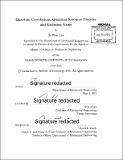Quantum correlations, quantum resource theories and exclusion game
Author(s)
Liu, Zi-Wen
DownloadFull printable version (7.162Mb)
Other Contributors
Massachusetts Institute of Technology. Department of Mechanical Engineering.
Advisor
Seth Lloyd.
Terms of use
Metadata
Show full item recordAbstract
This thesis addresses two topics in quantum information theory. The first topic is quantum correlations and quantum resource theory. The second is quantum communication theory. The first part summarizes an ongoing work about quantum correlations beyond entanglement and quantum resource theories. We systematically explain the concept quantum correlations beyond entanglement, and introduce a unified framework of measuring such correlations with entropic quantities. In particular, a new measure called Diagonal Discord (DD), which is simpler to compute than discord but still possesses several nice properties, is proposed. As an application to real physical scenarios, we study the scaling behaviors of quantum correlations in spin lattices with these measures. On its own, however, the theory of quantum correlations is not yet a satisfactory quantum resource theory. Some partial results towards this goal are introduced. Furthermore, a unified abstract structure of general quantum resource theories and its duality is formalized. The second part shows that there exist (one-way) communication tasks with an infinite gap between quantum communication complexity and quantum information complexity. We consider the exclusion game, recently introduced by Perry, Jain and Oppenheim [80], which exhibits the property that for appropriately chosen parameters of the game, there exists an winning quantum strategy that reveals vanishingly small amount of information as the size of the problem n increases, i.e., the quantum (internal) information cost vanishes in the large n limit. For those parameters, we prove the quantum communication cost (the size of quantum communication to succeed) is lower bounded by Q (log n), thereby proving an infinite gap between quantum information and communication costs. This infinite gap is further shown to be robust against sufficiently small error. Some other interesting features of the exclusion game are also discovered as byproducts.
Description
Thesis: S.M., Massachusetts Institute of Technology, Department of Mechanical Engineering, 2015. Cataloged from PDF version of thesis. Includes bibliographical references (pages 131-138).
Date issued
2015Department
Massachusetts Institute of Technology. Department of Mechanical EngineeringPublisher
Massachusetts Institute of Technology
Keywords
Mechanical Engineering.